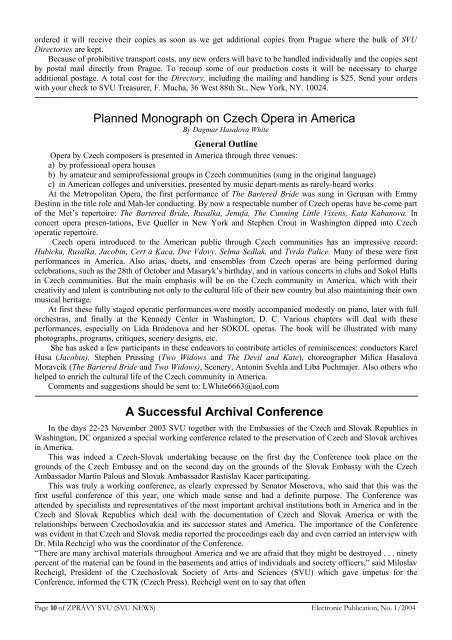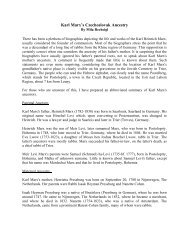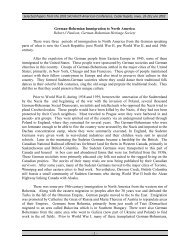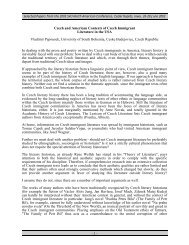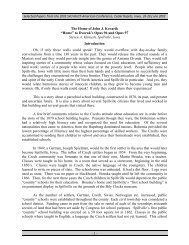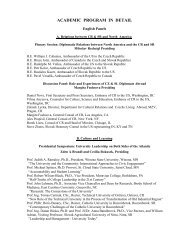ZPRÃVY SVU, Vol. 46, No. 1, January-February 2004
ZPRÃVY SVU, Vol. 46, No. 1, January-February 2004
ZPRÃVY SVU, Vol. 46, No. 1, January-February 2004
Create successful ePaper yourself
Turn your PDF publications into a flip-book with our unique Google optimized e-Paper software.
ordered it will receive their copies as soon as we get additional copies from Prague where the bulk of <strong>SVU</strong><br />
Directories are kept.<br />
Because of prohibitive transport costs, any new orders will have to be handled individually and the copies sent<br />
by postal mail directly from Prague. To recoup some of our production costs it will be necessary to charge<br />
additional postage. A total cost for the Directory, including the mailing and handling is $25. Send your orders<br />
with your check to <strong>SVU</strong> Treasurer, F. Mucha, 36 West 88th St., New York, NY. 10024.<br />
Planned Monograph on Czech Opera in America<br />
By Dagmar Hasalova White<br />
General Outline<br />
Opera by Czech composers is presented in America through three venues:<br />
a) by professional opera houses<br />
b) by amateur and semiprofessional groups in Czech communities (sung in the original language)<br />
c) in American colleges and universities, presented by music depart-ments as rarely-heard works<br />
At the Metropolitan Opera, the first performance of The Bartered Bride was sung in German with Emmy<br />
Destinn in the title role and Mah-ler conducting. By now a respectable number of Czech operas have be-come part<br />
of the Met’s repertoire: The Bartered Bride, Rusalka, Jenufa, The Cunning Little Vixens, Kata Kabanova. In<br />
concert opera presen-tations, Eve Queller in New York and Stephen Crout in Washington dipped into Czech<br />
operatic repertoire.<br />
Czech opera introduced to the American public through Czech communities has an impressive record:<br />
Hubicka, Rusalka, Jacobin, Cert a Kaca, Dve Vdovy, Selma Sedlak, and Tvrda Palice. Many of these were first<br />
performances in America. Also arias, duets, and ensembles from Czech operas are being performed during<br />
celebrations, such as the 28th of October and Masaryk’s birthday, and in various concerts in clubs and Sokol Halls<br />
in Czech communities. But the main emphasis will be on the Czech community in America, which with their<br />
creativity and talent is contributing not only to the cultural life of their new country but also maintaining their own<br />
musical heritage.<br />
At first these fully staged operatic performances were mostly accompanied modestly on piano, later with full<br />
orchestras, and finally at the Kennedy Center in Washington, D. C. Various chapters will deal with these<br />
performances, especially on Lida Brodenova and her SOKOL operas. The book will be illustrated with many<br />
photographs, programs, critiques, scenery designs, etc.<br />
She has asked a few participants in these endeavors to contribute articles of reminiscences: conductors Karel<br />
Husa (Jacobin), Stephen Prussing (Two Widows and The Devil and Kate), choreographer Milica Hasalová<br />
Moravcik (The Bartered Bride and Two Widows), Scenery, Antonin Svehla and Liba Puchmajer. Also others who<br />
helped to enrich the cultural life of the Czech community in America.<br />
Comments and suggestions should be sent to: LWhite6663@aol.com<br />
A Successful Archival Conference<br />
In the days 22-23 <strong>No</strong>vember 2003 <strong>SVU</strong> together with the Embassies of the Czech and Slovak Republics in<br />
Washington, DC organized a special working conference related to the preservation of Czech and Slovak archives<br />
in America.<br />
This was indeed a Czech-Slovak undertaking because on the first day the Conference took place on the<br />
grounds of the Czech Embassy and on the second day on the grounds of the Slovak Embassy with the Czech<br />
Ambassador Martin Palous and Slovak Ambassador Rastislav Kacer participating.<br />
This was truly a working conference, as clearly expressed by Senator Moserova, who said that this was the<br />
first useful conference of this year, one which made sense and had a definite purpose. The Conference was<br />
attended by specialists and representatives of the most important archival institutions both in America and in the<br />
Czech and Slovak Republics which deal with the documentation of Czech and Slovak America or with the<br />
relationships between Czechoslovakia and its successor states and America. The importance of the Conference<br />
was evident in that Czech and Slovak media reported the proceedings each day and even carried an interview with<br />
Dr. Mila Rechcigl who was the coordinator of the Conference.<br />
“There are many archival materials throughout America and we are afraid that they might be destroyed . . . ninety<br />
percent of the material can be found in the basements and attics of individuals and society officers,” said Miloslav<br />
Rechcigl, President of the Czechoslovak Society of Arts and Sciences (<strong>SVU</strong>) which gave impetus for the<br />
Conference, informed the CTK (Czech Press). Rechcigl went on to say that often<br />
Page 10 of ZPRÁVY <strong>SVU</strong> (<strong>SVU</strong> NEWS) Electronic Publication, <strong>No</strong>. 1/<strong>2004</strong>


